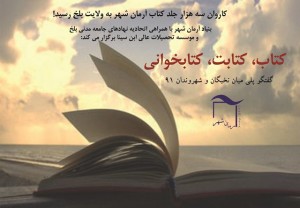Caravan of 3,000 Armanshahr books & Debate
To mark the arrival of Caravan of 3,000 Armanshahr books in Mazar-i-Sharif, the 91st Goftegu debate (6th year), a bridge between the elite and the citizens, of Armanshahr Foundation, entitled “From Book to Freedom of Expression” was organised in Ibn-e Sina University of the city on 5 September 2012. More than 250 men and women, including university professors and students, attended.
Jawad Darwaziyan, from Armanshahr Foundation, said: “Armanshahr Foundation started operating six years ago. Its central offices are located in Kabul and it has an office in the Herat province. The Foundation is mainly involved in human rights, civil society, cultural and publishing activities. Armanshahr has published more than 100,000 copies of books on human rights, literature, culture and society.”
Saleh Mohammad Khaligh, writer and director of Balkh’s Culture and Information Department, Master Afif Bakhtari, a contemporary poet, Taghi Vahedi, writer, and Ms. Farkhondeh Rajabi, writer and student of Balkh University, discussed the topic of ‘Books and Freedom of Expression.’
Saleh Mohammad Khaligh said: “Balkh has occupied a high status as a cradle of civilisation and culture since the old times. There has been a rich culture of book reading and writing. History bears witness that Balkh was one of the first lands in the region where books were written and read.
“A number of great internationally acclaimed scholars, e.g. Avicenna of Balkh, were assigned as librarians of the great libraries in this land.
“Fortunately, the culture of reading, writing and book maintenance is reviving again.”
He disclosed that there are in excess of 50 operating libraries in addition to the public library in Balkh. They are either affiliated to various governmental and non-governmental educational, cultural and political institutions or to book lovers.
Mr Taghi Vahedi offered his reminiscences about books: “I have sweet and bitter memories. Once I was going around Mazar-i-Sharif and there was a book sale, where I bought more than 100 titles. The bitter feeling came from the fact that the books had been plundered during the mujahedin anarchy. Every book that I bought had the stamp of a library. Under the Taleban, we had to disband a library with 1000 titles and bury those books. Five years later, when we took them out, some of them had been destroyed.
“When the Taleban established their rule in this city, I had 200 pages of memoirs, which I deemed valuable. However, they were all lost and I cannot replace them today.
One of the reasons for the failure of the growth in writing and reading books is the chronic and widespread poverty, which forced everybody to seek to save themselves. They could not think further about their collective destiny. The second reason is a fatalistic attitude to books by both writers and readers. The overwhelming majority think that whatever we go through has been decided in advance and we cannot change it regardless of what we do. The third factor is the strong shadow of despotic governments. They never allowed anybody to express their ideas; anybody who did it would go to prison.”
Ms Farkhondeh Rajabi argued that the failure of the universities to pay attention to reading, poverty and illiteracy are factors that have undermined reading and writing books: “There are 71 public libraries in the whole of Afghanistan, three of which are in Balkh. Those libraries have lost their audience for various reasons.
“Some of the specialised centres, such as the universities, should have played a greater role in producing knowledge. However, that is a slow process as a result of absence of a demand and supply market for cultural products.”
Pointing out the failure of certain ministries involved in the field of education and higher education to fulfil their tasks, she said: “There is a deep crisis in regard to writing and reading books.”
The last speaker, Mr Afif Bakhtari emphasised: “In the age of communications, there are more opportunities to teach humanitarian values. Communications bring power.”
To view the publications related to this issue, please refer to the following links:
Invitation to 91st Goftegu Public Debate: Book & Freedom of Expression in Balkh



